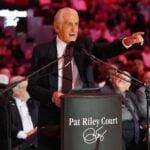
Pat Riley, the well-known and longtime president of the Miami Heat, has long been a champion of responsibility, structure, and discipline. As a head coach, he created winning teams that were driven by perseverance and cooperation. In his capacity as an executive, he established a culture that valued professionalism and commitment. What happens next will have you understand the mind of Riley. According to Clutch Points via X, he recently commented on reminding NBA players of what it means to be “under contract.”
Pat Riley’s Daring Reminder: The Meaning of Being “Under Contract”
Pat Riley’s Honest Assessment
“I understand this generation of players and how they want to go about living their lives. While you’re under contract with us, you do owe us something. Your collective bargaining agreement contract says that. So don’t ever take that lightly, and we have a very cooperative group of people.”Riley stated.
“I understand this generation of players and how they want to go about living their lives. While you’re under contract with us, you do owe us something. Your collective bargaining agreement contract says that. So don’t ever take that lightly and we have a very cooperative group… pic.twitter.com/9kI45UdP2m
— ClutchPoints (@ClutchPoints) January 9, 2025
Riley’s comments coincide with the league’s ongoing transformation due to player empowerment. It is becoming normal for superstars to dictate their locations, demand trades, and use their power. There is a saying that “it’s not the power you have, it’s how you use it.”
Also, it questions a player’s loyalty and how long a player should stay on one specific team. This can cause a massive ripple effect on fans who enjoy watching their franchise player play for another team. Riley made it very apparent that a contract is more than simply a document. A player and their team have a two-way agreement that is a commitment. His words highlight how crucial professionalism and commitment can change one’s perspective.
A Generational Shift
Riley’s recognition of this generation’s approach demonstrates a marked change in the league’s culture. The players of today place a high value on independence, personal growth, and brand building, which frequently prompts them to question established franchises.
In the past, players hardly ever tested organizational boundaries because contracts were seen as an opportunity for generational wealth. However, prominent NBA players like Kevin Durant, Damian Lillard, and James Harden have resisted, looking for trades to sign long-term contracts. Riley’s organization is frequently seen as a model for encouraging discipline and accountability while honoring the uniqueness of each player. Riley worked relentlessly to build a philosophy of personal independence and team ideals, turning into the “Heat Culture” catchphrase.
The Fine Line Between Empowerment and Obligation
Riley’s remarks strike a chord with critics, but they also draw attention to how complicated the current NBA is. Players are now influencers, marketers, and entrepreneurs in addition to being players. Their choices affect their family, mental health, and financial goals in addition to the basketball court.
However, Riley’s focus on carrying out contractual duties reminds us that organizations make large investments in their athletes. Based on these agreements, they create rosters, plan strategies, and sell tickets. When players interfere with these strategies, everything from the front office to the fan base impacts all.
A “Cooperative Group”
Interestingly, Riley praised his fellow players at the end of his speech, calling them “a very cooperative group of people.” This implies that his remarks were more of a reflection of league trends than they were of his present roster. Legends and stars like Dwyane Wade, Udonis Haslem, and Bam Adebayo are examples of the Miami Heat’s longstanding reputation for encouraging devotion and respect for one another.
The Last Word
Riley’s comments are a plea for balance as much as a critique. His advice to fulfill contracts adds a reasonable voice to a league where player empowerment is continuing to alter standards. After all, contracts stand for more than just formal commitments; they also reflect dedication, trust, and the common ambition of greatness.
The post Pat Riley’s Daring Reminder: The Meaning of Being “Under Contract” appeared first on Last Word On Basketball.
